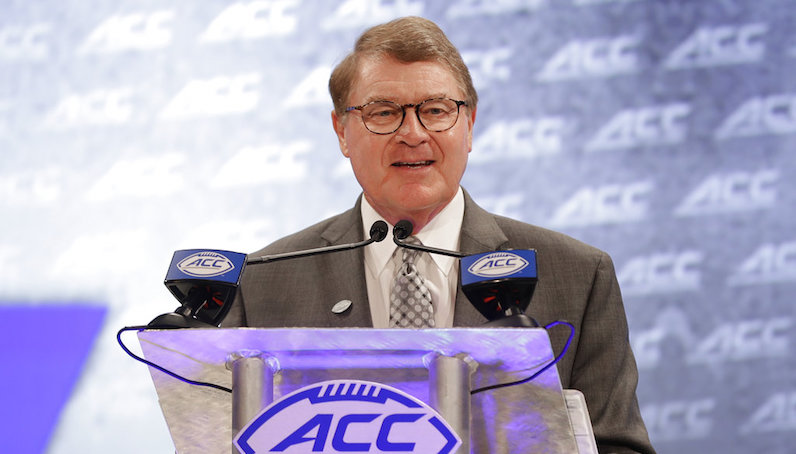As of right now, the ACC is still in the process of planning for a football season in the fall of 2020, amidst COVD-19 concerns. According to Dr. Cameron Wolfe, the ACC’s top medical advisor, there’s a way for the league to pull off a successful, safe season.
In a story with the Sports Business Journal, Wolfe, an infectious disease specialist at Duke, outlined his beliefs on mitigating risk and creating a sustainable environment for two teams to safely play against one another: 11 games per team, over 13 weeks.
#EXCLUSIVE: Top #ACC medical advisor Dr. Cameron Wolfe tells @SmittySBJ that he sees a safe path for college football to be played, despite #COVID19. Wolfe expressed confidence that #CFB can mitigate the risk of players and staff spreading the virus.
🏈: https://t.co/vyPWfvkipm pic.twitter.com/uWSyQn1Hp3
— Sports Business Journal (@SBJ) August 11, 2020
Safety methods will be far from cheap, but Wolfe believes there are ways to greatly reduce the risk of tracking COVID-19 onto the football field — or other locations of football operations. While discussing with SBJ, Wolfe likened it to being “no different than living as a student on campus.” (I’m not so sure that’s as reassuring as some would like it to sound, though.)
Outside of the ACC, the Big Ten and Pac-12 appear on the brink of postponing their seasons; however, nothing is official, yet. Votes are scheduled for Tuesday.
The SEC, on the other hand, continues to push forward, too, according to league commissioner Greg Sankey.
As SBJ notes, one member of the Pac-12’s advisory group — Dr. Dave Petron, a University of Utah doctor — has gone in the opposite route. Dr. Petron has advised the Pac-12 to halt and team activities.
This sort of gets at an ongoing problem with the sport trying to get off the ground this fall: too many cooks in the kitchen, with no central voice of authority. Schools and conferences have a variety of administrator types weighing in; school presidents will operate as the primary decision-makers, though.
There are also conflicting medical ideologies at play; with so much money on the table, the situation seems ripe for confirmation bias. Unsurprisingly, there’s a real lack of transparency with these efforts as well. Even as Dr. Wolfe talks with SBJ, he’s not exactly outlining the specifics of how to keep players safe.
Every commissioner: “We rely on our Medical Advisory Task Force Working Group Science Committee for all decisions.” Well, what specifically are they telling you?! Why are you not sharing that information, and sharing it with the public? So much for the “educational mission.”
— Jay Bilas (@JayBilas) August 11, 2020
At the same time, players — you know, the guys taking the greatest risk — are both voicing their opinions to play this season or opting out all together. The level of their involvement in the decision-making process, as schools worry about liability concerns, remains unclear, too.

















